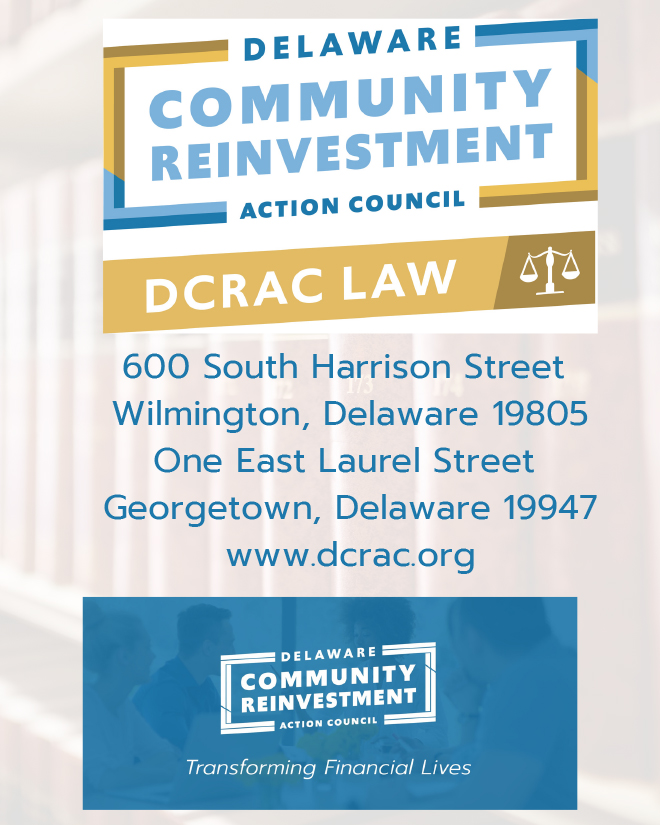Four Mistakes To Avoid In Estate Planning

By Jaclyn Quinn, Esq.
Delaware Community Reinvestment Action Council, Inc.
At DCRAC Law, our practice is centered on maintaining and securing wealth. We primarily assist individuals and families with estate planning and tax controversies. In doing so, we often find ourselves picking up the pieces after a family member passes away. When it comes to estate planning, the saying “an ounce of prevention is worth a pound of cure” is a reminder to plan well for the inevitable.
1. Don’t assume—seek expert advice
It’s important to do your research before making a big decision, but when it comes to estate planning, there is no replacement for talking to a real person. An attorney can discuss and explain the process and practicalities with you, as well as make recommendations for your specific circumstances. I’ve heard “I’m married so my spouse gets everything” or “I don’t have millions of dollars so I don’t need to plan” from more clients than I can count—but these statements aren’t true! Surprised? Estate planning is an essential process to protect everything you’ve earned and built in your life, and it’s worth the investment to get the best advice for your unique circumstances. There are countless “one size fits all” documents you can download and fill-in-the-blank forms to work from, but the truth is that each person’s situation is different—and a good professional can make sure your needs are taken care of.
2. Discuss your wishes with those involved
Estate planning includes assigning people in your life to specific roles: A power of attorney can manage your finances if you’re incapacitated. A healthcare agent makes medical decisions when you’re unable to. An executor gathers all of your assets after you pass away and ensures the bills are paid before distributing your assets according to your will. I always remind my clients to discuss these roles with their designated family members or friends—and that discussion often changes a client’s decision about whom to appoint. For instance, clients’ children might ask not to fill certain roles because they aren’t confident in their abilities to manage during trying times. It’s also not always the oldest family member or the one with the most education that should be appointed. Instead, prioritize designating agents who are up for the challenge to serve as your voice, your advocate, and your fiduciary to carry on your wishes.
3. Avoid ambiguity
Your estate planning has to explicitly state your wishes to work. There are often various options of how to achieve the desired result, but you have to document these choices. One frequent challenge I see is how to handle real estate upon passing. For example: Marie owns her home outright, and her daughter Heather lives with her. Marie doesn’t want to appear to favor Heather, so her will states that the house will go to all three of her children. Marie tells Heather not to worry, because her two brothers will take care of her, and even orders her sons to “take care of your sister.” But if all her will says is that the house goes to her children, this is a recipe for disaster upon Marie’s passing. We see scenarios play out on a monthly basis—and, more often than not, the siblings are not in agreement as to how they want to proceed. Without more details, Heather’s brothers may not even know how their mom wanted their sister “cared for,” and the legal ambiguity also means they could abuse the situation to Heather’s detriment.
4. Be consistent in your planning
Estate planning constitutes several basic but important documents—and it’s critical that your wishes are clear in all of them! Did you know that, for instance, beneficiary designations pass your assets onto a beneficiary outside of your will? That means if your largest asset is your 401(k), and you designate your brother as the beneficiary, this account will pass directly to him—even if your will says it should go to your sister. This confusion happens all the time, and it can cause undue and ongoing pain for a family already in mourning. Part of the estate planning process includes reviewing accounts, beneficiary designations, and intentions to make sure your intended recipients are the actual recipients. A good attorney will use all of these tools together to ensure your wishes are carried out.
If you need legal advice, we’re here to help. Jaclyn Quinn is licensed to practice law in Delaware. For more information, or to schedule a consultation, please call (302) 298-3251 or email Jaclyn at [email protected]. For more information, visit www.dcrac.org.
If you are in need of legal advice, we are here to assist you. Jaclyn Quinn is licensed to practice law in Delaware. For more information, or to schedule a consultation, please call 302-298-3251 or email Jaclyn at [email protected]. For more information, visit www.dcrac.org.
Bio
Jaclyn Quinn, Esq. joined the Delaware Community Reinvestment Action Council (DCRAC) in 2011, first as a volunteer, then as staff. In 2014 Jaclyn opened and grew her private practice until 2019, when DCRAC Law opened to the community. DCRAC Law is a nonprofit law firm providing tax, title, and other legal services to those unable to pay market rates.
Jaclyn graduated with a B.A. in Political Science from The College of New Jersey before moving to Delaware to pursue her J.D. at Widener University- Delaware Law School. She was admitted to the Delaware Bar in 2012, and is also barred in U.S. Tax Court and U.S. Immigration Court. She has volunteered with the Office of the Child Advocate, DVLS, and assists as pro bono counsel in a variety of cases. Jaclyn is a member of the Howard High School Academy of Finance Advisory Board.


